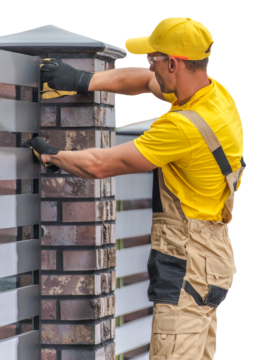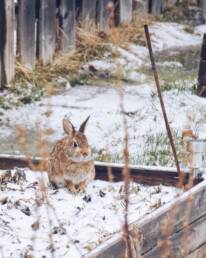Choose the Right Fence Material if Extreme Weather Is Common in Your Area
If you are planning to install a new fence, choose a fence material that will hold up under extreme weather if your geographical area is prone to severe weather conditions often. Aluminum fences tend to be damaged more often unless the homeowner is willing to perform some extra tasks to brace the fence and keep the surface protected with a special finish that will not rust as easy as the bare material will. Masonry or steel fences are better choices over aluminum in extreme weather areas.
Vinyl and PVC fences are better under severe weather conditions in some cases. Metal fences tend to be more durable in cold climates and can look fantastic for a very long time without the need for extensive upkeep if the metal has been treated with a protective coating.
Weatherproof an Existing Fence Prior to Onset of Bad Weather
Homeowners that live in areas of the country where snow, ice and other severe weather conditions are common during the winter months should weatherproof an existing fence prior to the onset of bad weather. If unsure of how to do this, consult with and/or hire a fence expert to give you advice or to perform the work for you at a reasonable price.
Wooden fences should be painted with a protective finish layer, and the fence posts may need to be braced so that high winds will not knock the fence down. Repair any small damage areas of your fence during warmer weather so that the problem areas do not worsen and weaken the fence’s integrity.
Keep the Area Around Your Fence Clear of Debris
There are many things that can cause a fence to become broken or otherwise damaged. This includes having the weight of heavy objects on vulnerable areas of the fence. Regularly clean around the fence to keep it clear of any debris like tree branches, piled up snow, garbage, items leaning on the fence, large piles of dirt and other items. Trees or bushes that are located too close to the fence may damage it when the roots tangle up with the posts underground.
What to Do After Heavy Snow, Hail or Ice Accumulates on Your Fence
Colorado and other regions often get hit with severe winter storms that can come with heavy snowfall, property damaging hail or rapid ice accumulations. Any of these weather-related circumstances can cause serious fence damage. Be sure to protect your fence by keeping it clear of heavy snow and use caution around your fence area when performing snow removal tasks.
Quickly Assess Your Fence for Damage After Extreme Weather Hits
Severe storms often cause major property damage, and fences are often damaged and should be assessed after these storms as soon as it is safe to do so. Keep tree branches and hedges situated close to your fence line trimmed back to lessen the risk of heavy branches or the tree itself falling on top of your fence. Falling trees can cause serious injuries and may be life threatening to people or animals caught in the path of a falling tree.
Fence Damage Signs to Watch for After Severe Storms or Other Damaging Event
There are some signs of fence damage to watch for after severe weather or other property damaging events like floods, fires or other catastrophes. Fences should be carefully inspected at least once a year and following extreme weather conditions. Taking care of small damages early can help protect your fence from serious damage in the future when the costs to repair or replace will be considerably higher.
Discoloration or Stains
If you notice discoloration of your fence or stains in certain areas, take time to determine the cause. Excessive or prolonged exposure to water or moist conditions can cause these issues. If trees or shrubs are planted too close to the fence, they may cause damage if they keep a wooden fence too shaded from the sun. This often results in dampness of the wood. On the other hand, excessive exposure to harsh sunlight might fade the paint on your fence.
Dirt and grime can cause stains that should be carefully cleaned off to help prevent further damage to the wood or other material underneath. Discoloration and stains are often a sign of too much moisture that could cause rust or rot if not fixed swiftly.
Rotten or Soft Wood Spots
Inspect your fence for signs of rotten or soft wood areas. This is usually caused by too much moisture. Carefully assess the posts especially where the bottoms are buried underground. Poor soil drainage can cause too much water to pool that could eventually cause rot to weaken your fence posts.
You may see fence boards or sections that appear warped. Wooden fences are especially prone to expansion and contraction of the material during shifts in temperature. These fence types will need extra weatherproofing and regular upkeep with painting to remain in good condition. Dry rot may occur even without too much moisture. The wood will appear darker in color and tends to warp and cause brittle splinters of the wood in impacted areas.
Broken or Missing Fence Sections
Always repair or replace any broken or missing fence sections quickly. Broken portions of the fence can become more susceptible to insect infestations if the fence is made of wood. When larger sections of fence are missing, animals may be able to get inside your yard.
Buildup of Debris
Check your fence for debris buildup especially following heavy winds or major storms. Isolated areas of a fence may trap any blown objects causing excessive weight to buildup that could damage your fence. Avoid piling snow in front of a fence. Ice accumulations can also cause serious harm to your fence.
What to Do if a Flood or Other Water Event Damages Your Fence
Floods can be caused with heavy rains or snowstorms that move through your area. However, flooding may happen as snow melts in the spring months, or a nearby water source may overflow its banks or barriers causing flooding in areas where it would normally be dry. These flood emergencies are best handled by professionals, and cleanup should be swift to avoid further water damage and possible mold issues that can occur rather quickly if conditions are right.
Reseal or Repaint Fences That Have Chips or Moisture Issues
Over time, paint, stain and protective finishes on a fence can begin to wear and chip. Exposure to direct sunlight may also weaken and fade the outer surface of your fence. Reseal or repaint any fence portions where chips, mars or moisture issues are found.
Clean and/or Sand Down Rust Areas or Replace Badly Rusted Fence Sections
Rust can corrode an entire fence if not stopped and repaired quickly. In some cases, small areas of surface rust on a metal fence may be sanded down and sealed with a protective coating. However, if the problem is severe, you will need to replace the damaged fence portions. The best cure for rust is to apply a rustproof finish coating to prevent rust from occurring. Any moisture issue will also need addressed to prevent reoccurrence.
Brace Fence Posts if High Winds Cause Damage & Reinforce Any Loose Sections
Areas that are prone to high windstorms, like hurricanes, tornadoes and bad winter storms, often see extensive property damage. High wind gusts are dangerous and cause many injuries and deaths every year. Fences are particularly vulnerable to high winds if not braced properly when installed. The posts should be reinforced to help prevent them from shifting and weakening under the wind force that can be brutal. This is sometimes a complex project that is usually best performed by a fence specialist.
Other Tips to Prevent Fence Damage Due to Extreme Weather
Keep tree limbs, bushes and hedges trimmed back if close to a fence. Consider adding a reinforced fence section where vulnerable fence sections are located to prevent future wind damage.
Avoid installing fence footings when the temperatures are extremely low. Check areas around the fence footings throughout the winter months and after stretches of bitterly cold weather or high winds curing colder months.
Take the appropriate steps to repair a damaged fence quickly following extreme weather conditions to avoid further and more extensive damage and to ensure fence integrity and safety.
Consider Hiring a Professional Fence Expert to Prevent or Repair Damage
Many homeowners do not have the proper tools or experience to perform major repairs to a damaged fence. It might be a good idea to hire a professional fence installation and repair company to do the work instead. These experts can also help homeowners to find solutions to their fence problems that can prevent damage from occurring in the first place.
Extreme weather conditions make it dangerous to be outside working with power equipment in unstable areas. Professionals will have the right tools and training to get the job done right the first time in the safest manner possible.
Get in touch with Denco Fence Company by phone or online 24/7 from the comfort of your home.

Need an expert opinion? Talk to our experts today!
When you talk to our experts at Denco Fence Company, we’ll help you compare fence styles, share design ideas, and answer any questions along the way. If you’re looking to build or repair a fence that you and your neighbors are going to love, get a free estimate and let us help bring your project to life.

